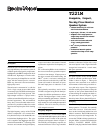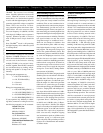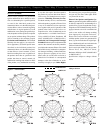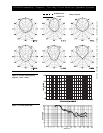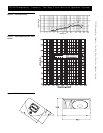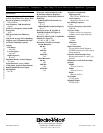
T221M Biampable, Compact, Two-Way Floor Monitor Speaker System
T221M Biampable, Compact, Two-Way Floor Monitor Speaker System
“BIAMP”. The crossover is now in biamp
mode. Carefully replace the crossover and
screws. When the crossover is in biamp
mode, there is an 18-microfarad capacitor
in series with the high-frequency driver for
protection against DC voltages or amplifier
failure. This is not a crossover. It is how-
ever, protection against some forms of am-
plifier failure. An active crossover with a
crossover frequency of 1,600 Hz (1.6 kHz)
with slopes of 12 dB per octave or greater is
required. Whenever possible, a crossover
with 24-dB-per-octave slopes should be
used.
Note: The PRO
TM
circuit is still protecting
the high-frequency driver when the system
is in biamp mode.
Connections
The T221M is equipped with Neutrik
Speakon
®
NL4MPR connectors. Two con-
nectors are installed in parallel, one mounted
on each end of the enclosure allowing
multiple T221M’s to be used and “daisy-
chained” together. These NL4FC connectors
are used because they are locking, self-po-
larizing and capable of 30 amps rms con-
tinuously.
Full-range pin arrangements are:
1– = IN, FULL RANGE(–)
1+ = IN, FULL RANGE(+)
2– = Not used
2+ = Not used
Biamp pin arrangements are:
1– = IN, LOW FREQUENCY (–)
1+ = IN, LOW FREQUENCY (+)
2– = IN, HIGH FREQUENCY (–)
2+ = IN, HIGH FREQUENCY (+)
If you experience any difficulty in obtain-
ing cables, connectors or wiring accessories,
the following companies can be contacted:
Neutrik USA, Inc.
1600 Malone Street
Millville, NJ 08332
Pro Co Sound, Inc.
135 E. Kalamazoo Avenue
Kalamazoo, MI 49007
Whirlwind Music Distributors, Inc.
P.O. Box 1075
Rochester, NY 14603
Power-Handling Capacity
To our knowledge, Electro-Voice was the
first U.S. manufacturer to develop and pub-
lish a power test closely related to real-life
conditions. First, we use a random-noise in-
put signal because it contains many frequen-
cies simultaneously, just like real voice or
instrument program. Second, our signal con-
tains more energy at extremely high and low
frequencies than typical actual program, add-
ing an extra measure of reliability. Third, the
test signal includes not only the overall
“long-term average” or “continuous” level—
which our ears interpret as loudness—but
also short-duration peaks which are many
times higher than the average, just like ac-
tual program. The long-term average level
stresses the speaker thermally (heat). The
instantaneous peaks test mechanical reliabil-
ity (cone and diaphragm excursion). Note
that the sine-wave test signals sometimes
used have a much less demanding peak value
relative to their average level. In actual use,
long-term average levels exist from several
seconds on up, but we apply the long-term
average for several hours, adding another
extra measure of reliability.
Specifically, the T221M is designed to with-
stand the power test described in EIA Stan-
dard RS-426A. The EIA test spectrum is
applied for eight hours. To obtain the spec-
trum, the output of a white-noise generator
(white noise is a particular type of random
noise with equal energy per bandwidth in Hz)
is fed to a shaping filter with 6-dB-per-oc-
tave slopes below 40 Hz and above 318 Hz.
When measured with an analyzer having the
usual constant-percentage bandwidth (one-
third octave), this shaping filter produces
a spectrum whose 3-dB-down points are
at 100 Hz and 1,200 Hz with a 3-dB-per-
octave slope above 1,200 Hz. This shaped
signal is sent to the power amplifier with the
continuous power set at 400 watts into the
5.98-ohm EIA equivalent impedance
(48.9 volts true rms). Amplifier clipping
sets instantaneous peaks at 6 dB above the
continuous power, or 1,600-watts peak
(97.8 volts peak). This procedure provides a
rigorous test of both thermal and mechani-
cal failure modes.
Architects' and Engineers'
Specifications
The loudspeaker system shall be a two-way,
full-range design consisting of a 305-mm
(12-inch) woofer in a vented enclosure, a
high-frequency compression driver mounted
on a 80° x 55° constant-directivity horn, and
a passive crossover/equalizer network, which
may be bypassed for use with an external
low-level active dividing network with a
corner frequency of 1,600 Hz. The loud-
speaker shall meet the following perfor-
mance criteria: frequency response of
100-16,000 Hz, –3 dB; full-range power
handling of 400 watts long term and 1,600-
watts short term with a shaped random-noise
input per EIA Standard RS-426A; low-fre-
quency power handling below 1,600 Hz in
the biamp mode of 400-watts long term and
1,600-watts short term with a shaped ran-
dom-noise input per EIA Standard RS-426A;
high-frequency power handling above
1,600 Hz in the biamp mode of 60-watts
long term and 240-watts short term with a
shaped random-noise input per EIA Standard
RS-426A; sensitivity of 101 dB SPL at 1 meter
with a 1-watt, 300- to 3,000-Hz pink-noise
input; 6-dB-down horizontal coverage angle
of 55° ±5° in the 5,000- to 16,000-Hz range;
6-dB-down vertical coverage angle of 80°
±5° in the 5,000- to 16,000-Hz range; cross-
over frequency of 2,600 Hz (electrical);
nominal impedance of 8 ohms; and mini-
mum impedance of 6.7 ohms. Input con-
nections shall be two paralleled Neutrik
Speakon
®
NL4MPR connectors for full-
range and biamp operation. The enclosure
shall be constructed of curved plywood,
covered with black textured paint and fit-
ted with a 16-gauge black steel grille, rub-
ber feet and a recessed carrying handle. Di-
mensions shall be 371 mm (14.62 in.) high x
594 mm (23.4 in.) wide x 406 mm (16.0 in.)
deep. Net weight shall be 22.3 kg (49 lb).
The loudspeaker system shall be the Electro-
Voice T221M.



